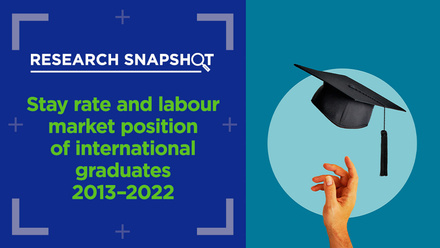International experience for the globalised workplace

An interconnected world relies not only on the global mobility of students in higher education but also on businesses and commerce that span borders, and on employees who are conversant in global languages and skills.
Study abroad experiences – academic or non-academic – help students acquire competencies that allow them to thrive in the workplace, bringing flexibility and adaptability to new people or situations, a tolerance for people of different origins, and communication styles that promote understanding and listening. These soft skills contribute to positive and diverse workplaces. They are also, incidentally, the skills that are critical at this juncture, as the COVID-19 pandemic threatens the global nature of education and business and requires all of us to quickly adapt to new realities.
In 2017, the Institute of International Education (IIE) in the United States conducted a study of the 21st-century skills exhibited by people who studied abroad, and how these translated to experiences in post-study employment. It found that students considered their study abroad experience to have influenced three intrapersonal competencies: intercultural skills, flexibility and adaptability, and self-awareness. Intrapersonal competencies are "talents or abilities that reside within the individual and aid him or her in problem solving". In addition to these skills highlighted by the students, IIE considers tolerance for ambiguity to be part of this domain.
It works both ways: employers are also looking for the skills that individuals with global experience are offering
I would like to focus on these intrapersonal competencies, as they are key components of positive outcomes in diverse workplaces and they are skills that employers emphasise when hiring diverse employees.
Direct relevance
Our evidence shows that global experiences matter for career pathways. An IIE impact study in 2019 found that 85% of students listed their study abroad experience on their resume or CV. Furthermore, 73% discussed their study abroad experience in a job interview and 52% felt that their experience contributed to receiving a job offer. In particular, students noted their ability to speak about their study abroad experience to show their level of independence, their ability to live and work in a different environment, and the growth and self-development they often had to go through in being away from their families and the comforts of back home.
For many students, the flexibility and adaptability they had to acquire – in learning a new language, navigating new places and interacting with new people – were skills of direct relevance to the realities of the job market. And when it came to being hired by global companies, studying in an international environment had offered students a perspective on global norms and practices, and meant they were comfortable working with others in a global setting.
It works both ways: employers are also looking for the skills that individuals with global experience are offering. In November 2019, IIE and AFS Intercultural Programs gathered top HR executives in New York to discuss the value of students with global experience in the workforce. Their perspectives aligned to the data in our studies. Students with a global perspective could contribute to tolerance and intercultural understanding in their company, and international experiences were a key marker that these young people had the independence to be able to take on work-related tasks. As noted by one respondent in the 2017 IIE study, "[The employer] definitely wanted to know how I handled living in a different environment [...] They were also interested in what other skills I gained from it, like resiliency and tolerance and understanding." Employers are looking for adaptability and the ability to work in a different environment – characteristics that can be gained and demonstrated by studying abroad.
Active contribution
Once individuals with global experience have been hired, their ability to apply their experience is another marker of success. Ideally, employers are not just looking for employees to ‘fit’ in their companies; they also want to nurture employees who can apply their skills in their work. There is evidence that once in the work environment, employees with global academic experience actively contribute to the well-being of their workplaces and ensure that diversity remains a key component of working life and culture.
Given the realities of COVID-19, there is perhaps more than ever a need to support the skills that students gain through international study
Recently, a study of the Ford Foundation International Fellowships Program (IFP) asked the employers of programme alumni about the impacts fellows were able to make on their organisations. Not all fellows in the programme studied abroad, but all were given education opportunities at universities away from home, thus taking them out of their local context. Some 77% of organisational respondents stated that IFP alumni introduced innovative ideas to influence programme design, 76% reported that alumni largely increased the visibility of their organisations, and 75% stated that IFP alumni markedly improved networking and partnership building. IFP alumni used their own experiences to contribute to their organisations’ networking and promotion, in some cases on a global scale.
Given the realities of COVID-19, there is perhaps more than ever a need to support the skills that students and professionals gain through international study and work experiences, when they are safe to resume. I come back to the critical skills of flexibility and adaptability, and the need to be able to navigate changing realities in both personal and professional domains. Individuals who have lived independently abroad are better prepared to face uncertainty in work and study – and are able to be resilient in the face of this uncertainty. They are people who can persevere and succeed in moments of ambiguity. In short, they are vital to businesses, government and non-governmental organisations, which will always require adaptability in the face of major shocks like the one we're living through now and those that await in the future.






